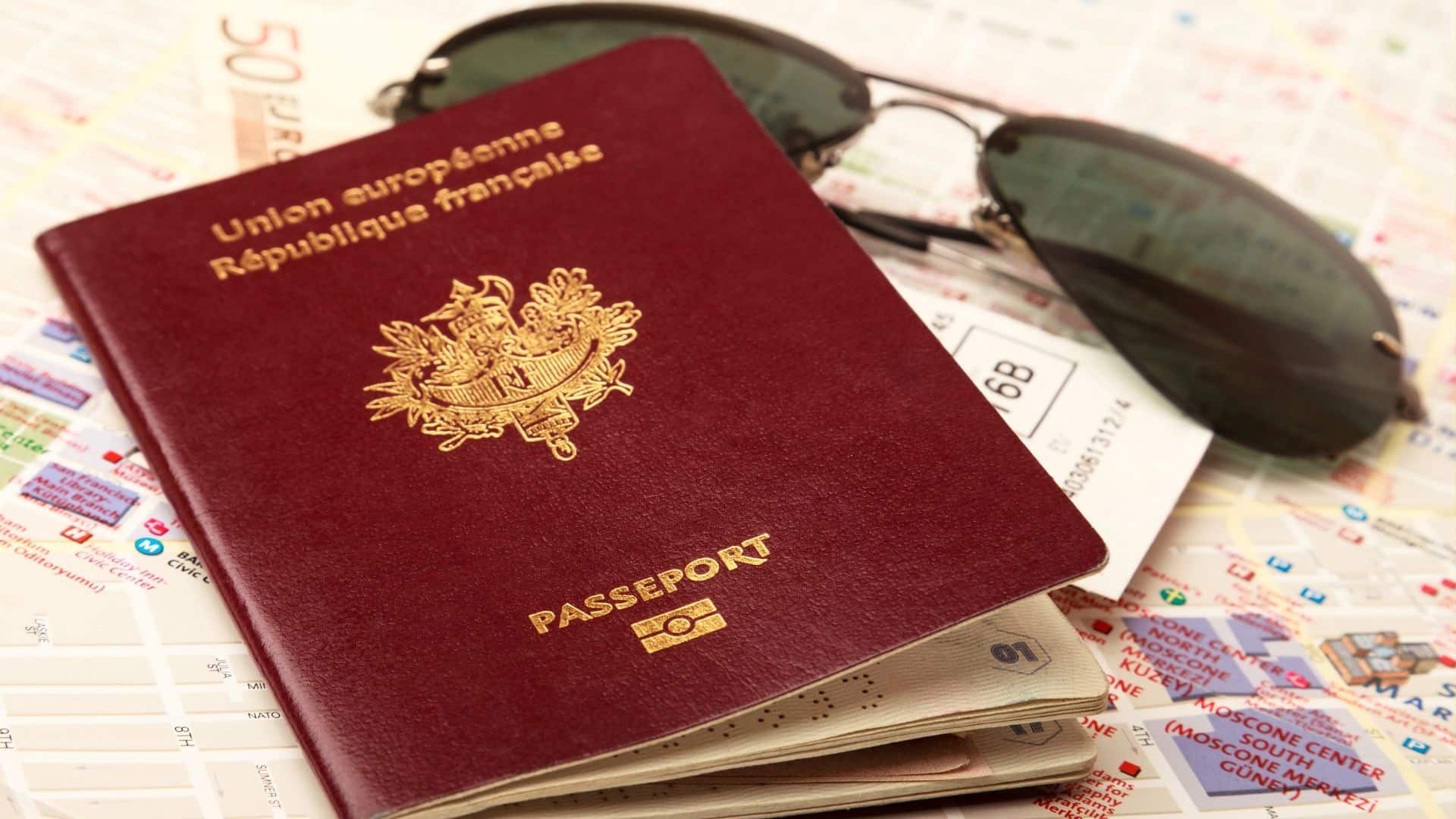One correspondent’s quest to procure French nationality and the maroon and gold passport that proclaims one a citizen of Europe.

A French passport. (Getty Images Signature)
It requires stamina and determination to become French.
It took me three years to thread my way through a bureaucratic labyrinth from which I emerged late last year clutching a shiny maroon and gold passport that proclaims my citizenship of the European Union as well as France.
I had given no thought to acquiring a new nationality when my wife and I settled in the Pyrenees more than a decade ago, knowing that Britain’s EU membership gave me the right to live and work anywhere in the union.
The 2016 referendum that led to Britain’s departure from the club punched a sickening hole in my complacency. Suddenly my status was up in the air, just as I was sinking roots and finding contentment in my new home.
A French passport would give me the right to vote and to enjoy travel and other protections within the EU. In the event of the far-right winning power in France, it would also protect me against any harsh anti-immigration measures.
Not that I would be their first target, as a legal migrant and one who is also white, Christian (long-lapsed) and European — like the millions of Ukrainians granted EU protection and the right to work after fleeing the Russian invasion nearly a year ago.
An emotive debate
France is formally blind to distinctions of race, colour and religion. But the politics of fear pervade the debate on migration, especially the illegal kind, focusing on Muslims and Africans escaping war, persecution or dire economic conditions at home.
Far-right populists and nationalists in France and elsewhere talk of an “invasion” of migrants or peddle theories about a “grand remplacement” which sees France and Europe as being overrun by Muslim outsiders who threaten their culture.
Such inflammatory discourse, variants of which targeted 20th century waves of migrants to France from Spain, Portugal, Italy and Poland, as well as North Africa, pushes governments towards tough responses and obstructs constructive discussion.
“If you come here and live like us, you are welcome,” said a French farmer I met recently, citing with approval earlier European immigrants who are now well-integrated. “Not those others, the Muslims, they can’t be French.”
He scoffed when I mentioned the millions of people of Muslim origin who are French citizens, many of them born here. For him they don’t exist, or shouldn’t.
In this view, France is for les Français de souche, understood to mean those who are native-born, white and preferably Catholic, not les Français de papiers (on paper).
Jobs no one else wants
Overall, seven million immigrants were living in France in 2021, or 10.3 percent of the population, of whom 2.5 million have become French nationals since arrival, according to INSEE, the national institute of statistics and economic studies.
Since France does not include questions about religion on census forms, no definitive figure exists for the number of Muslims here. Many immigrants do have Muslim origins, although with widely varying and evolving commitment to the faith.
France has relatively low unemployment at around 7.3 percent of the workforce and manpower is short in many sectors. But few politicians — or even business people who can’t find staff — dare to advocate accepting more immigrants to help fill these gaps.
Asylum-seekers already here are not allowed to work until their applications and appeals have been decided, which can take more than three years in some cases. Most of those who are rejected stay anyway and try to live under the radar.
France hosts hundreds of thousands of immigrants without papers who work clandestinely as care givers, labourers, cleaners, fruit pickers and rubbish collectors and at many other low-paid jobs, unsung and without the rights other employees enjoy.
A new immigration law is in the works. This would make it easier to expel foreigners “who don’t respect the values of the republic and commit offenses,” especially those seen as a security threat. It would also tighten border controls, crack down on people smugglers and make multi-year residence permits conditional on French language skills.
The draft law also proposes the issuance of work permits valid up to four years to attract foreign doctors and other health professionals to a sector under severe strain.
More controversially, the law would allow work permits, initially for one year, to be given to illegal immigrants employed in sectors where recruitment is difficult.
This idea has drawn fire from the rightwing opposition Les Républicains, whose support Macron’s minority parliamentary party would probably need to pass the law, and is anathema to the far-right Rassemblement National.
France’s dilemma reflects one facing the EU as a whole.
“To mitigate its demographic decline — and to do the jobs most Europeans don’t want to do any more — the union needs massive immigration, but many white Europeans do not want to see people of colour and unfamiliar habits in their neighbourhood,” wrote Stefan Lehne, senior fellow at Carnegie Europe.
Jumping the hurdles
Last year I was among 60,109 freshly minted French citizens, including 1,724 Britons, no doubt many of them Brexit orphans like myself.
My quest began in 2019 when I had completed the five-year residency requirement and started compiling my dossier to prove I ticked all the boxes for naturalisation.
I had to produce copious family documents, a lifetime of postal addresses — a challenge for a nomadic former foreign correspondent — plus proof I had no criminal record, had paid my taxes and could support myself.
Once I had distilled my past into a groaning file fattened by translations and copies in triplicate, I had to pass a French-language exam and, last but not least, secure an appointment to submit the dossier and be interviewed by an immigration official.
The crash-prone website for booking them seemed designed to stress-test one’s patience, if not one’s sanity. It took months before I found a slot.
Before the appointment in July 2021, two gendarmes turned up unannounced at home to confirm my bona fides — and to check me out with the neighbours.
The official who grilled me at the préfecture in Toulouse found light relief in my tangled history from birth in the Congo of Anglo-Scottish parents to cross-cultural marriages and stays in Muslim countries from Yemen to Afghanistan. “Vous êtes un cas particulier, n’est-ce pas?” I nodded, not really minding being a special case.
She asked me why I wanted to be French. Apart from practicalities, I told her I felt at home here, I had never stayed so long in the same place and had no plans to leave.
She probed my grasp of the values of the republic and laicité, France’s particular blend of laws upholding religious tolerance and a secular public sphere. I had to name five national monuments, rivers, cities, kings, dishes …
My head was reeling by the time the interrogation was over. Now you must wait for a year, she concluded.
I was expecting a letter from the Interior Ministry, but I first learned I was French from our local mayor who discovered my name on the electoral list in June 2022.
A few months later he drove my wife and I to a ceremony for new French citizens, featuring successful applicants from 16 nationalities: Ukrainian, Nigerian, Senegalese, Moroccan, Polish and my German spouse, among them.
Local officials presented us with a welcome pack featuring a letter bearing President Macron’s signature. Then primary school kids sang of Liberté, Égalité et Fraternité before everyone belted out La Marseillaise, whose alarmingly blood-soaked words we had learned the night before. To my surprise I felt my eyes misting over.
I will never be a Français de souche. But then an estimated one in four of my diverse new compatriots has at least one foreign-born parent or grand-parent.
My loyalties and identities remain stubbornly mixed up. Who to support when England next plays France in the World Cup? Perhaps Scotland will qualify.
Three questions to consider:
- How do migrants contribute to their host country?
- Why does their presence lead to controversy?
- Can migrants be good citizens while keeping links with their own culture or religion?

Alistair Lyon is former Middle East diplomatic correspondent for Reuters. During three decades at the news agency, he covered conflicts as well as political and economic news in the Middle East and beyond. He began in Lebanon and headed bureaus in Jordan, Turkey, Pakistan/Afghanistan and Egypt/Sudan. He spent five years in London as Middle East diplomatic correspondent and five in Beirut as special correspondent, Middle East.

Dear Alistair
Congratulations to you and your wife on becoming French. And thank you for this balanced article on a difficult topic.
Best regards,
Olivier